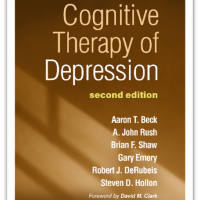Treating and preventing mood disorders in young people using best practice CBT
The workshop will describe strategies for helping patients increase their level of engagement with potential sources of reinforcement (behavioral activation) and learning to test the accuracy of their own beliefs (cognitive restructuring). Strategies for preventing onsets, relapse, and recurrence of depression will be presented.
NZPsS Member $100; NZPsS Student $50; Non-member $150
Please note that all registrations have to be paid in full before the event takes place - otherwise you will miss out on receiving the Zoom link (this is usually sent two days before the event takes place). This event will be recorded for all those who are registered on the day. Recording is available for three weeks – the link will be sent after the event.
Programme description: The goal of cognitive therapy is to help patients learn to recognize the role that inaccurate beliefs and problematic information processing strategies play in generating their negative affect and maladaptive behaviors. The workshop will describe strategies for helping patients increase their level of engagement with potential sources of reinforcement (behavioral activation) and learning to test the accuracy of their own beliefs (cognitive restructuring). Strategies for preventing onsets, relapse, and recurrence of depression will be presented.
The workshop will:
a. Review the current literature regarding empirical efficacy of interventions aimed at treating and preventing mood disorders in young people. We will focus on cognitive behavior therapy, but we also will describe other interventions that have shown some efficacy (e.g., Interpersonal Psychotherapy; Pharmacotherapy).
b. Present Basic Principles of CBT
- Cognitive Theory of Mood Disorders (ABCs)
- Beliefs and Behaviors can be Changed
- Emphasis on “Here and Now”
- Use of Concrete Examples
- Reliance on “Socratic” Questioning
- Empirical Approach to Testing Beliefs
c. Outline Stages of Treatment
- Providing a Rationale
- Self-Monitoring Moods and Activities
- Behavioral Activation Strategies
- Identifying Beliefs and Biases
- Evaluating and Changing Beliefs
- Core Beliefs/Underlying Assumptions
- Relapse Prevention/Termination
d. CBT across the lifespan (e.g., children and adolescents; elderly)
e. CBT for Prevention of Mood Disorders
The workshop will be interactive, incorporating role plays and audience questions throughout the meeting.
Presenters: Steven D. Hollon, PhD & Judy Garber, PhD
Steven D. Hollon, PhD, is the Gertrude Conaway Vanderbilt Professor of Psychology at Vanderbilt University. He is a former editor of the journal Cognitive Therapy and Research and a past president of the Association for Behavioral and Cognitive Therapy and the Society for a Science of Clinical Psychology. He received the Distinguished Scientific Award for the Applications of Psychology from the American Psychological Association and the Klerman Senior Investigator Award from the Depression and Bipolar support Alliance. Dr. Hollon’s work has focused on the treatment and prevention of depression with an emphasis on the enduring effects of psychosocial interventions. He and his colleagues have shown that cognitive therapy is as efficacious as anti-depressant medications in the acute treatment of severe depression, and CT has more enduring effects than medications. Recent work with colleagues has extended the efficacy of behavioral activation to low and middle-income countries (e.g., India). In 2024, Dr. Hollon completed the second edition of Cognitive Therapy of Depression with Aaron T. Beck, Robert J. DeRubeis, A. John Rush, and others.
Judy Garber, PhD, is a Professor of Psychology and Human Development, Emerita, at Vanderbilt University, former Director of Clinical Training and a former William T. Grant Faculty Scholar. She has received several awards for her scholarship including the Boyd R. McCandless Young Scientist Award for Research in Developmental Psychology, the David Shakow Young Investigator Award from the Division of Clinical Psychology of the American Psychological Association, an Independent Scientist Career Development Award from the National Institute of Mental Health, Cornelius Vanderbilt Chair at Vanderbilt University, and the Distinguished Scientist Award from the Society for the Science of Clinical Psychology of the Division of Clinical Psychology of the American Psychological Association. Dr. Garber’s research focuses on risk, treatment, and prevention of mood disorders in youth. She studies social-cognitive, environmental, biological, and interpersonal factors that contribute to the onset and maintenance of mood and anxiety disorders. Dr. Garber has conducted studies of the efficacy of CBT interventions with depressed adolescents, and the prevention of depression in high-risk youth (e.g., offspring of depressed parents; those high in trait negative affect). In a large prevention trial, she showed that a CBT group intervention prevented depression at low Dr. Garber’s currently is conducting a randomized controlled trial (RCT) testing the efficacy of CBT enhanced with training in theory of mind/perspective-taking, and a multi-site RCT testing the efficacy of a coached, online mindfulness program with adolescents.

